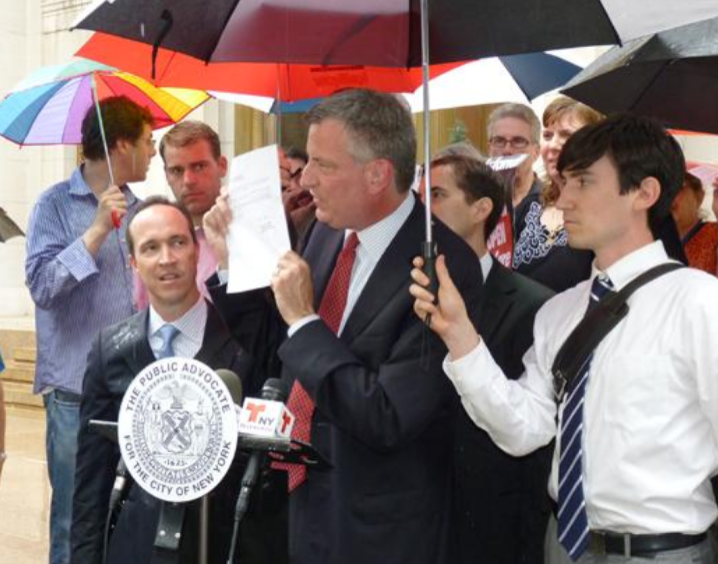NYC Mayoral Candidate Bill De Blasio Has Deep Ties To Law Firm Behind 'Citizens United' [EXCLUSIVE]

Public Advocate Bill de Blasio, the Democratic nominee to replace Michael Bloomberg as New York City’s mayor, has deep, long-standing connections to the law firm that argued on behalf of Citizens United in a landmark 2010 Supreme Court case that effectively dismantled key federal campaign finance regulations.
Despite his ties to that Los Angeles firm, Gibson Dunn & Crutcher, de Blasio, acting in his role as New York’s public advocate, crusaded for restraint in the wake of the Citizens United ruling, which gave corporations and special interest groups free rein to spend money on independent advertising supporting or opposing candidates and their positions. Limits remained on how much money these organizations could contribute directly to campaigns.
De Blasio's efforts were effective, helping to convince prominent companies to sign pledges to not increase their political spending as a result of the Citizens United decision. He set up a website that tracks which large corporations have and have not made the pledge, and spoke extensively about the need to ensure that Citizens United did not lead to corporations having undue influence on elections.
“The Citizens United decision delivered a body blow to our democracy and a fair and equitable election system,” de Blasio’s campaign website states. “Over the past three years, Bill de Blasio has successfully pressured companies such as Goldman Sachs, JPMorgan, Citigroup and Morgan Stanley to adopt policies against spending their corporate treasury dollars in elections.”
De Blasio's work to lessen the corruptive influence of the Citizens United decision represents just one part of de Blasio’s efforts to rein in the growing influence of money in elections, and his mayoral platform emphasizes his commitment to reforming campaign finance and making politics more transparent.
And yet Theodore B. Olson, a star attorney at Gibson Dunn, which has raised funds and backed de Blasio for many years, was lead counsel before the Supreme Court for the plaintiff in the Citizens United case.
“The Supreme Court's decision today is a victory for the First Amendment and the right of all Americans to participate in the political process,” Olson told the Atlantic in an emailed statement after the decision was handed down. The Supreme Court ruling effectively neutered aspects of the McCain-Feingold law, the most consequential federal campaign finance reform law passed in recent years.
Fundraising Activities
In January, just two weeks before de Blasio launched an underdog bid to become New York City's next mayor, a quiet, a closed-door fundraiser was held for the soon-to-be candidate at the Midtown Manhattan offices of the law firm Edwards Wildman. De Blasio delivered a wide-ranging stump speech in front of 70 attorneys, outlining his plan to tax rich New Yorkers to pay for public preschool programs.
It was “nothing remarkable, just one more successful fundraiser,” according to Ken Feinberg, a founder and managing partner at the law firm Feinberg Rozen, who dropped by for the occasion.
But like so much else de Blasio has done in his political career, it was made possible in part by Gibson Dunn. The de Blasio campaign disclosed that the Jan. 10 reception was one of four fundraisers for his mayoral bid co-hosted over the past three years by James Walden, a Gibson Dunn partner who declined to comment on behalf of his firm.
The fundraisers are an outgrowth of the attorney’s deep ties to de Blasio, given that "Walden has been a long time supporter of Bill's,” de Blasio's campaign spokesman Dan Levitan told WNYC in March.
In addition, Gibson Dunn, which reportedly hosted a de Blasio fundraiser of its own last month, represented the Public Advocate's officepro bono in a lawsuit to stop two Brooklyn hospitals from closing down and the law firm donated the maximum $4,950 through its political action committee (PAC) to de Blasio's mayoral campaign in January, according to campaign finance disclosures.
Backing the Race
Gibson Dunn has also made sizable contributions to other candidates in this year's New York mayoral race. Campaign finance records reveal that the firm, either on its own or through its PAC, has also contributed the maximum allowable $4,950 to the campaigns of James J. Lhota, de Blasio's Republican opponent, and former Comptroller William C. Thompson Jr., who lost the Democratic primary to de Blasio. The firm’s PAC also contributed $4,950 to de Blasio’s successful 2009 campaign for public advocate.
Employees of Gibson Dunn have donated a total of $17,640 to de Blasio’s 2013 mayoral campaign, according to campaign finance records. And they contributed $9,200 to his 2009 campaign for public advocate. In 2011, Walden contributed $4,950 of his own cash to de Blasio’s 2013 mayoral campaign, then pitched in an extra $2,475 on Aug. 28 under New York City Campaign Finance Board rules that allow for contributors to make additional donations in the 10-day period following contested primary elections.
In the 2013 mayoral race, Gibson Dunn employees also donated a total of $9,900 to Lhota’s campaign and a whopping $29,250 to Thompson’s failed bid, much of which was collected on July 11, 2012, when de Blasio’s chances of winning the Democratic nod looked weak at best.
Campaign finance records show the firm’s employees also contributed a total of $12,800 to former front-runner City Council Speaker Christine Quinn’s failed campaign for the Democratic nomination, and $125 to the unsuccessful mayoral bid of Democrat Sal Albanese.
Walden declined to comment for this article on behalf of Gibson Dunn, and the de Blasio and Lhota campaigns did not respond to repeated requests for comment.
© Copyright IBTimes 2024. All rights reserved.





















